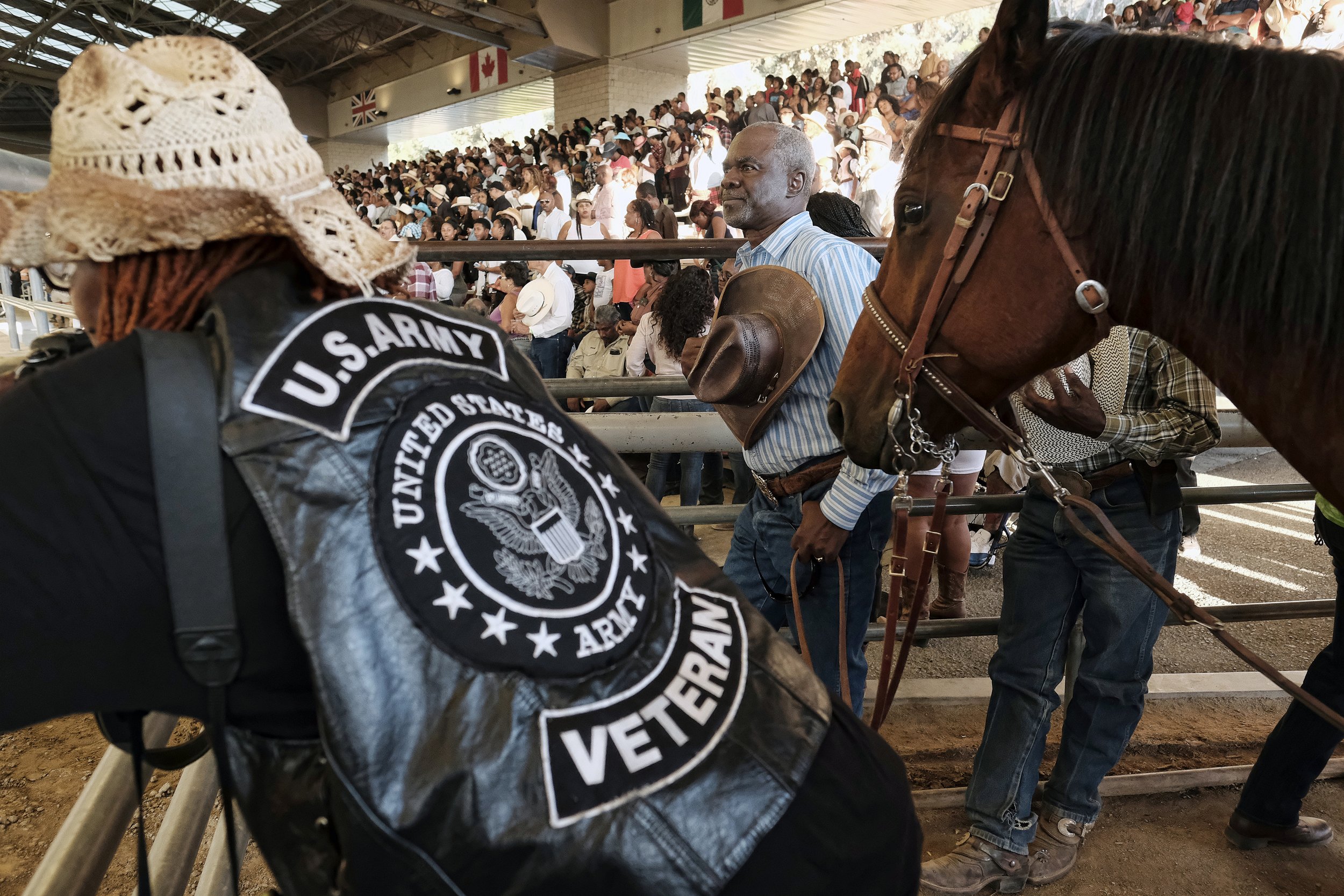Compton's cowboys

Long before NWA put the place on the map as the birthplace of gangsta rap and its streets echoed with the sounds of drive-by gunfire, Compton was a cowboy town. And it still is.
Go down any major thoroughfare on most any weekend, and you're likely to find someone like Ivory McCloud decked out in his cowboy boots and hat, proudly riding his horse.
"I've got 40 years in this, man," the 56-year-old horseman says exuberantly. "My dad was a cowboy. I'm a cowboy. I grew up in Compton. I live in Compton, and I've been training horses since I was a kid."
He trains Tennessee Walkers, high-gait show horses, in the backyard of his home. But it's Diamond, his prized blue-eyed Palomino that he proudly rides in parades and rodeos whenever he can. And along the streets of his hometown.
But if he tries to explain to someone at an out-of-town rodeo that he comes from Compton, the reaction is almost always the same: "They have horses? IN COMPTON?"
Dressage rider Xavier Allison says he gets the same when he's away at historically black Fisk University in Tennessee, where he's a sophomore studying business. Everyone there knows where Compton is, Allison says. But nobody believes him when he tells them he rides horses here.
"In our neighborhood, there's about 400 homes, a couple hundred horses, and some goats and cows and chickens," laughs Mayisha Akbar, who lives in Richland Farms, a 10-square-block, semi-rural corner of Compton that time seems to have overlooked.
She moved here with her family almost 30 years ago, looking for a place where she and her kids could ride horses, like she did when she was a kid.
She found it on the quiet, somewhat dusty streets of a neighborhood with ranch homes of all shapes and sizes, each with a backyard big enough to stable a horse.
But the real estate agent arrived at a time when warring street gangs were threatening to tear the city apart and drive-by shootings were common.
"We had this drug war that kind of destroyed two generations of families," she said. "We had kids raising kids, and it was really a sad time."
She put her three children on horses to keep them out of trouble, and soon she found other kids wanted to ride with them. So Akbar formed the Compton Jr. Posse and began teaching riding.
McCloud and other old-timers pitched in. Many had parents or grandparents who had moved from rural areas to a place where they could keep their horses as they found work a few miles away in post-World War II Los Angeles.
Eventually the Compton Jr. Posse built its own stable and riding ring in three adjoining backyards. Hundreds of rescued horses and kids later, the nonprofit group began turning out a new generation of riders like 23-year-old Tre Hosley, who competes on the Professional Rodeo Cowboy Association circuit.
One of the association's few black bareback riders, he says he got some double takes at first.
"They were like, 'Who the hell is this kid?'" he recalled with a laugh. "But after kind of proving myself, and making some good rides, I felt there was a little bit of a buzz, especially after I started winning."
Compton was a nearly all-white city in the 1940s when it counted among its residents future Presidents George H.W. Bush and George W. Bush. It was essentially all black in the 1980s when sisters Venus and Serena Williams were growing up to become their generation's greatest tennis players. Its population of 98,000 is now 65 percent Hispanic, 33 percent black.
The horses represent the one group whose numbers have remained stable, thanks to Richland Farms zoning as an agricultural neighborhood.
Violent crime, meanwhile, is down in Compton compared with what it once was, although locals will tell you there are still neighborhoods you'd best stay out of.
"I'm wearing blue, and I wouldn't wear this nowhere outside my house, and nowhere outside these gates, really," says Allison, who hopes to compete in the Olympics someday. His riding jacket on this day is the color worn by Crips gang members.
But if he leaves the jacket behind and takes just the horse out, his biggest worry likely will be dodging cars and dogs, not bullets.
"Gangsters turn into little kids when they see a horse," says Hosley, recalling how he once rode one into the wrong neighborhood and was confronted by a handful of gang members — who wanted to play with the horse.
"They're not even worried that I'm from a different neighborhood and I'm not supposed to be here," he recalled. "It's like, 'Wow, you've got a horse, man. Can I pet it?' It kind of levels the playing field wherever you go."
Text from AP news story, They're cowboys _ and they're coming straight outta Compton, by John Rogers.
See these photos on APImages.com
Follow AP photographers on Twitter: http://twitter.com/AP/lists/ap-photographers
Spotlight is the blog of AP Images, the world’s largest collection of historical and contemporary photos. AP Images provides instant access to AP’s iconic photos and adds new content every minute of every day from every corner of the world, making it an essential source of photos and graphics for professional image buyers and commercial customers. Whether your needs are for editorial, commercial, or personal use, AP Images has the content and the expert sales team to fulfill your image requirements. Visit apimages.com to learn more.
Written content on this site is not created by the editorial department of AP, unless otherwise noted.
AP Images on Twitter | AP Images on Facebook | AP Images on Instagram





















